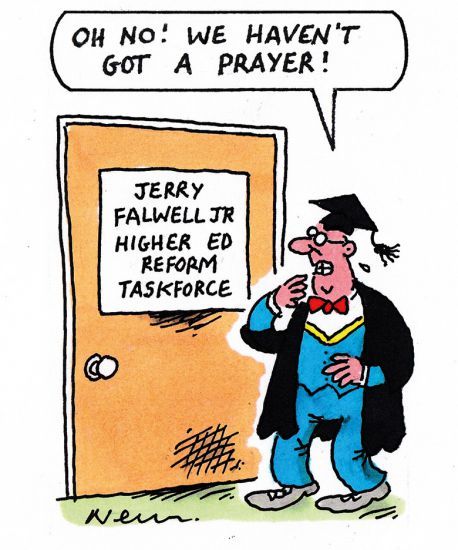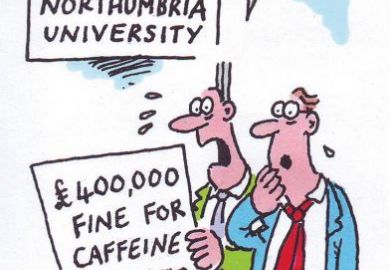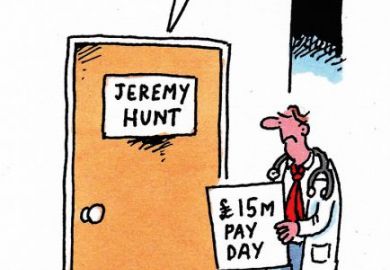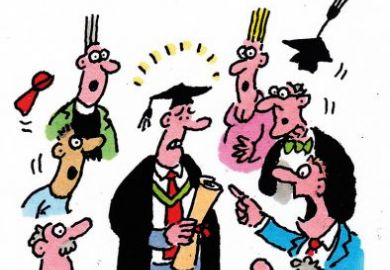
Sir Mark Walport’s new imperium over UK research has clearly caused a bit of tension in some quarters of academia. While the vast majority were quick to hail the appointment of the former Wellcome Trust head when he became the government’s chief science adviser, some sceptical voices are making their misgivings known about his new role overseeing a £6 billion a year budget as head of UK Research and Innovation. In a tweet on 2 February, James Wilsdon, professor of research policy at the University of Sheffield, claimed that a “v senior scientist” had told him that he “feel[s] marginally better about MW at UKRI than DJT in the White House but it’s close”. However, this did not please one big beast of the policy world – David Sweeney, research director at the Higher Education Funding Council for England – who felt that the Trump comparison was “offensive” and “OTT”, tweeting back that Sir Mark was “richly-qualified” for the top job. “Time to pull together,” he added. Insisting that he was just the messenger, Professor Wilsdon added that it was wrong to pretend that the appointment was a universally popular one. “You know as well as me that MW is a controversial choice,” he fired back, adding: “Are we all to clap like seals & pretend that’s not the case?”
Donald Trump’s war on reason continued apace last week with the news that evangelical Christian leader Jerry Falwell Jr is to head a higher education task force. Mr Falwell – who recently unveiled plans to open the country’s first on-campus shooting range at Liberty University, where he is president – will be in charge of rolling back the “over-regulation” of US higher education, CNN reported on 2 February. Of course, “over-regulation” is not a word that could be applied to “Liberty” University, where bans on dancing, drinking, gambling, smoking, witchcraft, gay rights groups and short skirts have attracted headlines over the years. Mr Falwell did, however, have some success in scrapping the pesky legislation that stopped students from carrying guns in student halls. With Liberty science textbooks famously explaining the “freight capacity” of Noah’s ark (answer: 1.4 million cubic feet), many Americans have wondered how the gun-promoting creationist has managed to bag such a role. “This is the worst pick in the world’s 6,000-year history,” one writer concluded wryly.
Meanwhile, Mr Trump’s threat to withdraw federal funds from the University of California, Berkeley over violent campus protests also sent a chill through US academia last week. Riled by the university’s cancellation of a talk by right-wing provocateur Milo Yiannopoulos after a protest by 1,500 students turned ugly, the US president suggested that the San Francisco institution “does not allow free speech and practises violence on innocent people with a different point of view”. “NO FEDERAL FUNDS?” he added in an unprecedented presidential attack on university autonomy on 2 February. Even the free speech group FIRE felt that Mr Trump’s intervention was unfair, saying that any move to strip Berkeley of funds would be “deeply inappropriate and most likely unlawful”.
The University of Cambridge is admitting more state-educated students than universities such as Durham, Bristol and St Andrews, BBC News online noted on 2 February. With 62 per cent of its freshers coming from state schools – up from 54 per cent a decade ago – Cambridge’s private school intake is now only the ninth largest in percentage terms, the site said. In contrast, the University of Oxford had the lowest state school admittance rate, falling by 2 percentage points over the past five years to 55.7 per cent. The statistics showed that Cambridge is a “diverse place and nothing like the rumours or typical media stories”, even if “myths persist” about its supposedly Hooray Henry undergraduates, said Sam Lucy, director of admissions.
Peter Mathieson, the head of the University of Hong Kong, will take a massive pay cut when he steps down to take the reins at the University of Edinburgh, the South China Morning Post reported on 2 February. Professor Mathieson, who has led Hong Kong since April 2014, told staff in an email that he was leaving for “personal reasons” next January, but stressed that there would be “no loss of momentum at HKU” in the year ahead. The former University of Bristol medic is likely to take a huge pay hit when he moves: the current Edinburgh vice-chancellor’s remuneration is only about half the size of Professor Mathieson’s current package, worth HK$5.8 million (£598,000), the paper notes. Once in post in Edinburgh, Professor Mathieson will have to scrape by on a salary closer to £300,000, the Post adds.
Register to continue
Why register?
- Registration is free and only takes a moment
- Once registered, you can read 3 articles a month
- Sign up for our newsletter
Subscribe
Or subscribe for unlimited access to:
- Unlimited access to news, views, insights & reviews
- Digital editions
- Digital access to THE’s university and college rankings analysis
Already registered or a current subscriber?


